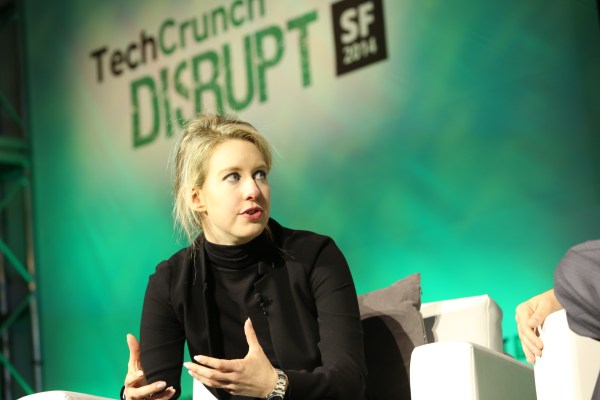Update: Theranos has reportedly dialed back its 240 blood tests to just one. According to the Wall Street Journal, a source close to the matter told the paper that Theranos has caved under regulatory pressure from the Food and Drug Administration and has stopped collecting drops of blood for all but one of its tests.
Bloomberg later confirmed this Thursday evening in an interview with founder Elizabeth Holmes. According to the news outlet, Theranos is using its technology on only one of its tests and most of its blood tests are running on non-Theranos devices at the moment.
“We’ve been transitioning to the FDA system voluntarily. As of right now, we’re only using it for the one test,” Holmes told Bloomberg.
Holmes went on CNBC’s Mad Money with host Jim Cramer to dispute a scathing Wall Street Journal report that the company was struggling with results of its blood-test technology; that some results of tests were way off; and that Theranos was only using its tech for 15 tests and instead outsourcing most of the 240 total it offers to other machines from outside manufacturers.
Theranos denied those claims in a blog earlier Thursday. We reached out to Holmes through public relations channels after the post and to request our own interview but have not heard back.
“Today’s Wall Street Journal story about Theranos is factually and scientifically erroneous and grounded in baseless assertions by inexperienced and disgruntled former employees and industry incumbents,” reads a statement on Theranos’ website.
It’s tough to know who’s right. The Journal is a large news organization that strives for accuracy in reporting. But Theranos claims it presented “more than 1,000 pages of statements and documents” to refute the claims made by former employees. The Journal not only interviewed former workers – including one senior employee – but also doctors, nurses and other experts for the piece.
Theranos founder Elizabeth Holmes began a full PR campaign on Twitter soon after the WSJ article went out and the company posted a statement about the claims today:
According to WSJ, some former employees told the reporter working on the piece that diluting the blood drawn by pricking a finger caused some inaccuracies in test results. One former employee allegedly told the Journal, “Some of the potassium results at Theranos were so high that patients would have to be dead for the results to be correct.”
These are very serious allegations for a company that is on a roll in Silicon Valley. Theranos’ current valuation stands at a whopping $9 billion, making Holmes the youngest female billionaire in the U.S. Former Secretary of State Henry Kissinger is on the board and some even liken Holmes to Steve Jobs for her choice of minimalist black turtleneck garb.
Holmes appeared onstage at Disrupt SF with our own senior editor Jon Shieber to showcase the tech behind the claim that Theranos can detect anything from cancer, diabetes and HIV with just a drop of blood.
[tc_aol_on code=”518405804″]
Theranos uses a blood-warming packet applied to the forefinger. A tiny “nanotainer” then almost unnoticeably pricks the skin to get the blood to use for testing purposes. Seems like a great idea for someone who hates needles. Theranos promises to be cheaper, faster and to need much less blood than traditional methods. It sounds revolutionary, but one false test could be a death sentence.
Theranos claims it has proven itself as “accurate and reliable for tens of thousands of satisfied customers through millions of tests and experiences and in on-going review by our various regulators.”
The FDA gave a nod to the company this summer and Theranos partnered with Walgreens to provide upfront costs for lab test results in real-time, using its technology.
But the Journal is not the first skeptic. Stanford medical school professor John Ioannidis, a known expert on the credibility of medical studies, cautioned the hype around Theranos in the Journal of the American Medical Association, “stealth research creates total ambiguity about what evidence can be trusted in a mix of possibly brilliant ideas, aggressive corporate announcements, and mass media hype.”
The WSJ wrote previously about others in the field questioning the claims of the company, interviewing experts in the field. And Jerry Yeo, a professor and director of Clinical Chemistry Laboratories at the University of Chicago, questioned the company’s practices in Business Insider: “They completely bypassed the traditional process of peer review or publishing in peer-reviewed journals or having peer labs evaluate their product,” he said.
“Stories like this come along when you threaten to change things, seeded by entrenched interests that will do anything to prevent change, but in the end nothing will deter us from making our tests the best and of the highest integrity for the people we serve, and continuing to fight for transformative change in health care,” Theranos stated today.
